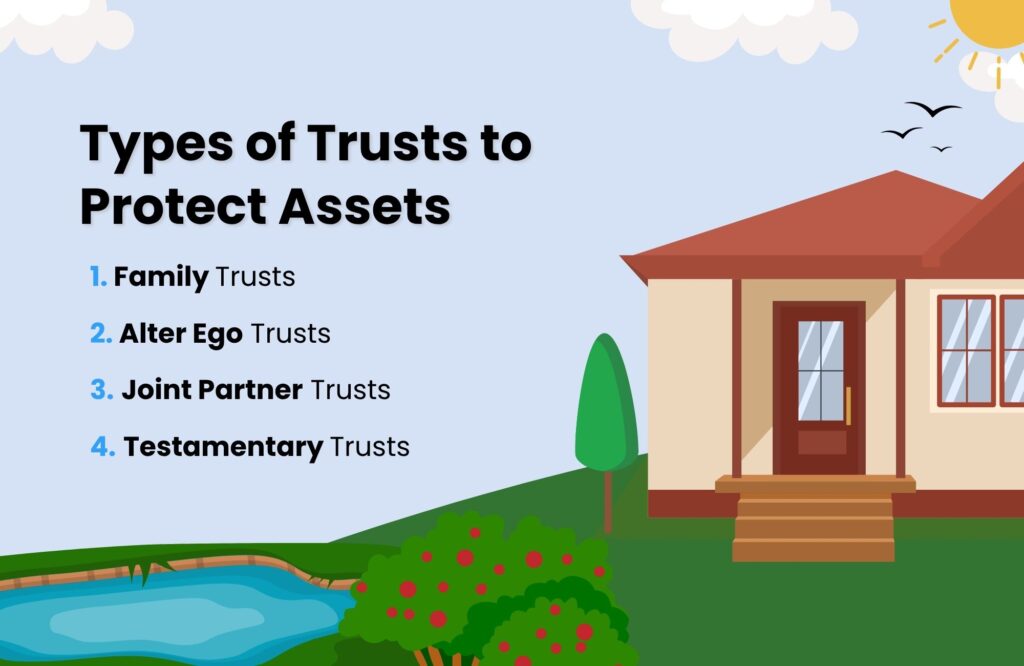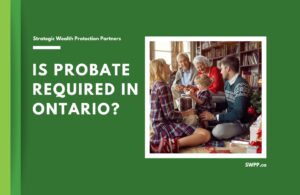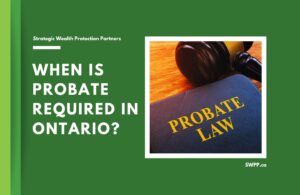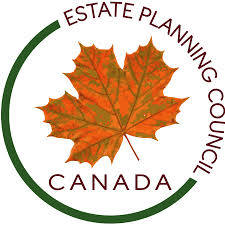Written by Ron Cooke, President & Founder of Strategic Wealth Protection Partners in Ontario, CEA®, Member of the Estate Planning Council Canada
How Can Trusts Protect Assets in Canada?
In Canada, a trust is a legal arrangement where one person (the trustee) manages assets on behalf of someone else (the beneficiary).
The person who sets up the trust is called the settlor. When structured and maintained properly, a trust may help reduce exposure to risks such as divorce, family disputes, legal claims, and creditors.
Many business owners and wealthy families use discretionary family trusts.
These give the trustee discretion over how and when money is distributed, which can make it more difficult (but not impossible) for creditors or ex-spouses to claim those assets.
Trusts in Canada can also help:
- Keep your estate private and avoid probate fees,
- Transfer assets tax-efficiently to your children or grandchildren,
- Protect your children’s inheritance from future divorces or lawsuits,
- Provide continuity and control if you become incapacitated.
But the trust needs to be set up early and correctly.
If you try to move assets into a trust after there’s already a legal claim or dispute, courts may see that as suspicious and undo it. That’s why the best time to explore a trust strategy is before there’s a problem.
Think of it as building a legal firewall for your wealth—one that needs careful planning and maintenance to work properly.
In addition, a trust isn’t the right solution for every estate planning problem. Work with a professional estate planner in your region who can help guide you towards using the right tools for your situation.
And, make sure you read this entire post to find out about the main tax traps and pitfalls of trusts.

Table of Contents
- Which Trusts in Canada Protect Assets?
- What Is a Trust and How Does It Work?
- What Are the Roles of the Settlor Trustee and Beneficiary?
- Basics of Asset Protection and Trusts in Canada
- Revocable vs Irrevocable Trusts for Asset Protection
- Living Trusts vs Testamentary Trusts
- Types of Trusts to Protect Assets
- Use Cases for Trusts
- What Assets Can You Place in a Trust in Canada?
- What Are the Tax Benefits of Trusts in Canada?
- Why You Need to Know about the 21-Year Rule
- Are There Any Trust Tax Traps?
- Is Trust Law Federal or Provincial in Canada?
- Should You Use a Trust in Succession and Estate Planning?
- Common Questions
- Final Thoughts
Key Takeaways:
- Trusts are legal entities that separate ownership and control to protect and manage assets.
- Irrevocable trusts provide stronger protection than revocable ones.
- Proper setup and intent are critical for asset protection in Ontario.
- Trusts can reduce probate, control distributions, and maintain privacy.
- Professional legal and tax advice is essential before creating a trust.
Which Trusts in Canada Protect Assets?
While Canada doesn’t have formal “asset protection trusts,” the following types of trusts can help protect assets when used correctly:
- Discretionary Family Trust
- Alter Ego and Joint Partner Trusts
- Testamentary Trusts
- Spousal Trusts
Note: Asset protection is never absolute. Trusts must be properly structured in advance of any claims or disputes to be effective.

What Is a Trust and How Does It Work?
A trust is a legal entity created when one person (the settlor) transfers assets to another (the trustee) to hold and manage for the benefit of others (the beneficiaries). In Canada, trusts are used to protect, manage, and distribute wealth during life or after death.
What Are the Roles of the Settlor Trustee and Beneficiary?
Every trust involves three main parties who each have distinct responsibilities:
- The Settlor is the person who creates the trust and contributes assets to it. They establish the trust deed, which outlines how the assets will be managed and distributed.
- The Trustee is the individual or corporation responsible for managing the assets according to the trust deed and in the best interests of the beneficiaries. Trustees have a fiduciary duty, a legal obligation to act with honesty, diligence, and loyalty.
- The Beneficiary is the person (or people) who benefit from the trust. They may receive income, capital, or both, depending on the terms set by the settlor.
The relationship between these three parties forms the foundation of every trust. While the settlor gives up ownership of the assets, the trustee takes legal control, and the beneficiaries enjoy the benefits, all guided by the trust’s written terms.
Basics of Asset Protection and Trusts in Canada
Although formal asset protection trusts (like those found in offshore jurisdictions) don’t exist in Canada, trusts can still help shield assets from risks when structured correctly.
Trusts can:
- Separate legal ownership (held by the trustee) from beneficial ownership (enjoyed by the beneficiaries).
- Help preserve family wealth for future generations.
- Reduce exposure to creditors or lawsuits by placing assets under a separate legal entity.
- Support tax planning and minimize estate costs.
- Control how and when beneficiaries receive inheritances.

What Are the Limits of Asset Protection in Trusts?
Trusts are not impenetrable.
Their protective benefits depend heavily on how they are created and managed. For example:
- If a trust is set up improperly or for the purpose of avoiding creditors, courts can set it aside.
- Beneficiary disputes or misuse by trustees can expose assets.
- Family law claims may still impact trust assets, especially in separation or divorce cases if a spouse can prove beneficial interest or control.
Revocable vs Irrevocable Trusts for Asset Protection in Canada
A trust can be revocable or irrevocable. Many family trusts are irrevocable by design. So “irrevocable” is a feature, not a standalone purpose-driven trust type. Revocable trusts are rare in Canada outside of Alter Ego or Joint Partner Trusts, which I’ll cover in the next section.
Revocable Trusts
A revocable trust allows the settlor to change or dissolve the trust during their lifetime. Because the settlor retains control, assets in a revocable trust are not fully protected from creditors or legal claims. These trusts are typically used for estate planning simplicity, such as Alter Ego or Joint Partner Trusts, which allow older Canadians to avoid probate and maintain control of their assets during their lifetime.
Irrevocable Trusts
An irrevocable trust cannot be easily changed once established. Because the settlor permanently gives up control and ownership, these trusts offer stronger protection against creditor claims or lawsuits.
Irrevocable trusts are often used for:
- Estate tax planning — freezing the value of assets to reduce future capital gains tax.
- Charitable giving — allowing assets to benefit a cause while providing potential tax deductions.
- Wealth preservation — ensuring assets pass to future generations according to specific wishes.
Living Trusts vs Testamentary Trusts
A living trust and a testamentary trust describe how and when a trust is structured and takes effect, not distinct “types” of trusts in the same sense as family, spousal, or alter ego trusts.
A living trust helps you manage and protect assets while you’re alive, while a testamentary trust takes effect after your death to control how your estate is distributed.
| Feature | Living Trust (Inter Vivos Trust) | Testamentary Trust |
| When It’s Created | During your lifetime | Takes effect after your death (through your will) |
| Common Types | Alter Ego Trust, Joint Partner Trust, Family Trust | Testamentary Spousal Trust, Testamentary Family Trust |
| Control During Lifetime | You (or your trustee) manage assets while alive | No control during lifetime; activated after death |
| Probate Fees | Can help avoid probate on trust-held assets | Assets go through probate as part of your estate |
| Privacy | Keeps details private (not part of public probate record) | Estate details become public through probate |
| Taxation | Trust pays its own taxes annually; subject to 21-year rule | Separate tax return for each trust; also subject to 21-year rule |
| Use Cases | Estate privacy, incapacity planning, multi-generational wealth transfer | Ongoing support for a spouse, children, or dependants after death |
| Flexibility | Can be amended (revocable) or fixed (irrevocable), depending on type | Terms fixed once the will is finalized |
| Best For | Those wanting control and privacy during life | Those wanting to manage inheritance after death |
Types of Trusts to Protect Assets
Family Trusts
A Family Trust is a discretionary trust often used by business owners and incorporated professionals for income splitting, succession planning, and protecting family assets from business or creditor risks. The trustee decides how income and capital are distributed among beneficiaries, providing flexibility and control.
Alter Ego Trusts
An Alter Ego Trust is a type of living trust available to Canadians aged 65 or older. It allows you to move assets into the trust and retain full control during your lifetime. After your death, assets pass directly to beneficiaries without probate, offering privacy and efficiency.
Joint Partner Trusts
A Joint Partner Trust is similar to an Alter Ego Trust but for married or common-law couples. Both partners retain control of the assets during their lifetimes, and the trust continues until the surviving partner’s death, at which point assets transfer to beneficiaries without probate.
Testamentary Trusts
A Testamentary Trust is created through a will and only comes into effect after death. It’s often used to provide ongoing support for dependants, control inheritance timing, or protect assets from external claims after you pass away.

Use Cases for Trusts
Trusts in Bankruptcy and Creditor Claims
Courts in Canada generally respect the separation between personal assets and trust assets.
If properly established, assets legally owned by a trustee may be protected from the settlor’s personal creditors. However, if the trust was created to deliberately defraud creditors, courts can reverse or disregard it.
Trusts in Divorce and Family Law Matters
In Ontario, family law courts often examine whether a spouse has control or beneficial interest in trust assets.
A discretionary trust, where the trustee has full control over distributions, provides stronger protection than one where a spouse is guaranteed benefits.
Trusts for Estate Planning and Succession
Trusts play a key role in multi-generational wealth planning.
They allow you to control when and how your heirs receive their inheritance, minimize taxes, and protect family privacy. They can also help support family members with special needs or ensure responsible stewardship of family wealth.
What Assets Can You Place in a Trust in Canada?
You can transfer many types of assets into a trust, including:
- Real estate (principal residence, cottages, investment properties)
- Investment accounts and portfolios
- Private company shares or business interests
- Cash and GICs
- Life insurance policies
- Art, jewelry, or other valuable personal property
What Are the Tax Benefits of Trusts in Canada?
Trusts can create income-splitting opportunities among beneficiaries in lower tax brackets, though recent tax changes have limited this flexibility. They can also help defer or minimize capital gains taxes when structured correctly.
However, trusts are taxed at the highest marginal rate on undistributed income, so proper tax planning is essential.
Why You Need to Know about the 21-Year Rule
In Canada, most trusts face a 21-year deemed disposition rule, meaning the trust is treated as if it sold and repurchased its assets every 21 years. This can trigger capital gains tax.
Strategic planning, such as transferring assets to beneficiaries before the 21-year mark, helps manage this risk.
Are There Any Trust Tax Traps?
Yes. Some common traps include:
- Transferring property to a trust at less than fair market value, which can trigger immediate taxes.
- Failing to document trust distributions properly.
- Overlooking the 21-year rule or misunderstanding residency rules for foreign beneficiaries.
Working with a qualified estate planner and tax professional helps prevent these costly mistakes.
Is Trust Law Federal or Provincial in Canada?
Trust law is provincial, governed by each province’s Trustee Act and related case law.
In Ontario, the Trustee Act and Succession Law Reform Act outline how trusts must be created and administered.
Should You Use a Trust in Succession and Estate Planning?
A trust can be a valuable part of your succession and estate planning strategy, helping to preserve wealth, control inheritance timing, reduce probate, and protect privacy. However, trusts are complex legal entities that require proper drafting, ongoing management, and coordination with your will and tax strategy.
If you’re considering a trust, I recommend speaking with an experienced estate planner in Ontario who can determine whether it fits your goals and family dynamics. Book a consultation to explore your best options.

Common Questions
Which trust is best for asset protection?
Irrevocable discretionary trusts generally offer the strongest protection because assets are no longer owned or controlled by the settlor.
How do I protect my assets from creditors in Canada?
Properly structured trusts can separate ownership, but timing and intent matter. They must be established before any creditor issues arise.
What are the disadvantages of a trust in Canada?
Trusts can be costly to set up and maintain, have complex tax rules, and may not always provide absolute protection.
Should I put my house in a trust in Canada?
You can, especially for probate or incapacity planning, but it should align with your overall estate and tax strategy.
At what net worth do you need a trust in Canada?
Generally, households with $1 million or more in assets, or complex family/business structures may benefit from a trust.
Final Thoughts
Right now, you may be researching how to shield your wealth from taxes, family disputes, divorce, lawsuits, or creditors. Whether your goal is tax-efficient succession planning or maintaining control over your legacy, trusts can be a powerful tool when used appropriately.
Trusts are not for everyone. They come with legal, tax, and administrative responsibilities. But when designed by an estate planning expert who understands all available tools, from insurance to trusts to corporate structures, they can help you protect your life’s work and pass it on meaningfully.
If you’re ready to explore whether a trust fits into your estate plan, book a confidential consultation today.
Canadian Resources:
Discover the Benefits of a Living Trust in Ontario
Are you an Ontario resident considering a living trust as part of your estate planning?
At Strategic Wealth Protection Partners, we’re here to guide you through every step of the process with expert advice and personalized support. Begin your estate planning journey today with a Living Estate Plan Consultation from our experienced team.
Our mission at SWPP is to help you create an estate plan that secures your legacy, shields your assets from unnecessary taxation, and ensures your loved ones are cared for. By designing a living trust tailored to your goals, our experts will help you build a plan that truly reflects your values and priorities.
Take control of your future—start planning today!
Schedule a Living Estate Plan Consultation
Planning your legacy is about more than numbers—it’s about ensuring your family remembers you and your values are honoured for many years to come.
Estate planning and trusts can feel overwhelming, especially if it’s your first time. That’s why we’re here.
With our simple, 5-Step Living Estate Plan, we make the process easy, helping you create a comprehensive estate plan or trust that protects your assets from taxes and probate fees while preserving your legacy. Tools like The Final Word Journal capture your story, wishes, and essential details like accounts and end-of-life plans, ensuring your family has clarity and comfort.
Take the first step today—schedule a consultation call and give your family the ultimate gift: peace of mind and the assurance they were always your priority.
Read More
If you’re starting your estate planning process, you may find these articles helpful:
- Is a Living Trust Better than a Will in Canada?
- Why the ‘death binder’ is becoming an essential part of estate planning
- 8 Reasons You Should Do Business Succession Planning in Canada
About the Author
RON COOKE, PRESIDENT & FOUNDER OF STRATEGIC WEALTH PROTECTION PARTNERS

With over 30 years in financial services, I’ve seen the challenges families face when a loved one passes—lost assets, unnecessary taxes, and emotional stress. That’s why I created the Living Estate Plan, a comprehensive process to protect assets, eliminate estate and probate fees, and create legacies that are remembered for many years to come.
This plan ensures your family receives not just your wealth, but a meaningful reminder of your care and love. Tools like The Final Word Journal capture your story, wishes, and essential details, offering clarity and comfort during difficult times.
Your final gift should be more than money—it should be peace of mind, cherished memories, and an organized estate.
Schedule a Call
Schedule a 30-minute consultation call with Strategic Wealth Protection Partners.
Click HERE to schedule a consultation.









